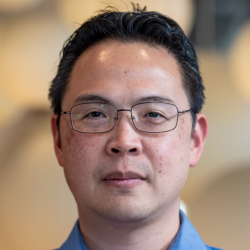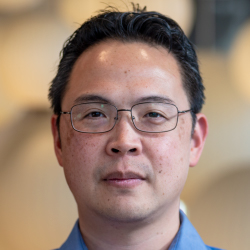Frederick Shic, PhD

- Academic Title: Professor of Pediatrics; Adjunct Professor of Computer Science and Engineering; Adjunct Professor of Psychology
- Research Center: Center for Child Health, Behavior and Development
"My passion is to merge technology and clinical insight to build next-generation tools for understanding and improving the lives of children with autism and other developmental conditions."
-
Biography
Frederick Shic, Professor, CCHBD, Department of Pediatrics, Division of General Pediatrics. Dr. Shic, trained in computer science, investigates the mechanisms, markers, and developmental processes associated with autism and other neuropsychiatric conditions using neurobehavioral techniques (eye tracking), neurophysiological techniques (functional near infrared spectroscopy), and technology-enhanced behavioral paradigms involving mobile applications, social robots, and video games.
Frederick Shic, PhD, is a Professor at University of Washington and a Principal Investigator at Seattle Children's Research Institute. Dr. Shic's current research interests include applications of eye-tracking and neuroimaging techniques (e.g. near infrared spectroscopy and magnetic resonance spectroscopy) to the study of the social and cognitive development in infants, toddlers, and children with autism, and the exploration of new technologies and methodologies for enriching both our understanding of autism and the lives of children with autism and their families. Prior to his appointment, Dr. Shic completed an NIMH T32 training program in childhood neuropsychiatric disorders led by Drs. James Leckman and Elena Grigorenko. He then was an associate research scientist under Dr. Katarzyna Chawarska, director of the Infant and Toddlers Developmental Disabilities Clinic and the Yale Early Social Cognition Laboratory. Next, Dr. Shic led the Technology and Innovation Laboratory at Yale University's Child Study Center. Dr. Shic received his doctorate in computer science from Yale University and an undergraduate degree in engineering and applied sciences from the California Institute of Technology. During his graduate work, Dr. Shic developed computational and mathematical approaches for analyzing eye-tracking data, with a focus on what these techniques can tell us about the social and cognitive development of children with autism spectrum disorders (ASD). Before that, Dr. Shic was software engineer at the Sony Interactive Studios of America, and, later, a researcher at the Huntington Medical Research Institutes, where he conducted research in 1H and 13C magnetic resonance spectroscopy (MRS), developing techniques for quantifying and visualizing brain metabolism and neurochemistry.
Research Description
The mission of Seattle Children's Innovative Technologies Laboratory (SCITL) is to bridge computer science, engineering, and developmental and clinical science in order to advance new tools for understanding and improving child mental health. Our current work leverages non-invasive technologies to study eye movements and brain activity in a quest for new biomarkers that can help us better understand natural variability, inherent mechanism, and response to treatment in conditions such as autism spectrum disorder (ASD). Other research platforms we use include mobile apps, video games, and social robots. Our work has been funded by the National Institute of Mental Health (NIMH), the Institute of Education Science (IES), Simons Foundation, and Autism Speaks.
-
Related Resources
-
Frederick Shic, PhD Researcher Profile
View the Seattle Children's Research Institute profile of Frederick Shic including their publications and grants.
-
Seattle Children’s Innovative Technologies Lab (SCITL)
SCITL is dedicated to using, advancing and developing everyday technologies for improving the lives of children with autism spectrum disorder and other developmental disabilities. Learn more about our mission, areas of work and how to participate in our research studies.
-
-
Patient Testimonials
-
Awards and Honors
Loading...Award Name Award Description Awarded By Award Date {{ award.name }} {{ award.description }} {{ award.organization }} {{ award.displayDate }} No Awards and Honors found for Frederick Shic, PhD
-
Publications
Loading...No Publications found for Frederick Shic, PhD
-
Presentations
Loading...Presentation Title Event Location Date {{ presentation.title }} {{ presentation.presentedAt }} {{ presentation.location }} {{ presentation.displayDate }} No Presentations found for Frederick Shic, PhD
-
Research Funding
Loading...Grant Title Grantor Amount Award Date {{ funding.title }} {{ funding.grantedBy }} {{ funding.amount }} {{ funding.displayDate }} No Research Funding found for Frederick Shic, PhD
-
Clinical Trials and Research Studies
Loading...{{ item.st }}
No clinical trials found for Frederick Shic, PhD.
